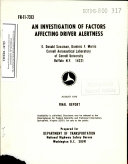Cognitive Effects And Academic Consequences Of Video Game Playing
View
@ University of Mississippi Libraries
Hollis, Sean
Description
Introduction: prior video game playing (vgp) research has generated mixed empirical findings. Recent studies suggested positive effects vgp may have on cognitive skills, particularly improvements in visuospatial skills, processing speed, working memory, multitasking, and problem solving skills. By contrast, other studies have suggested that vgp leads to lower academic performance - indicating further research on vgp effects is needed. This study investigated the effects of vgp on cognitive skills and academic performance. Methods: 208 participants were recruited from the University of Mississippi psychology department in exchange for research participation credit. The sample was 68.9% female and 31.1% male. Ages ranged from 18-40, though 92.9% of participants were between the ages of 18-21. Ethnic breakdown was - 77.5% Caucasian, 12.9% African American, 6.2% Asian, 1.0% Hispanic, and 2.4% other. Participants were administered a battery of demographic and vgp habit questionnaires, and measures of problem solving, executive control, time management, memory, attention, and spatial skills. Participants were divided into three groups - heavy gamers (5+ hours vgp/week), sometime gamers (1-4 hours/week), and non-gamers (0 hours/week). Results: sometime video game players were found to perform better on measures of time management (f (2, 205) = 4.15, p = .017), and memory (f (7, 200) = 2.21, p = .035); and marginally better on measures of problem solving (f (2, 205) = 2.70, p = .07), and executive control (f (7, 200) = 2.05, p = .051) than were heavy gamers and non-gamers. Heavy gamers also reported the greatest number of problems related to...
Text
Application/Pdf
2014 01 01 T08:00:00 Z
Record Contributed By
University of Mississippi LibrariesKeywords
- Academic Performance
- Attention
- Clinical Psychology
- Cognitive Abilities
- Problem Solving
- Time Management
- Video Game Playing















